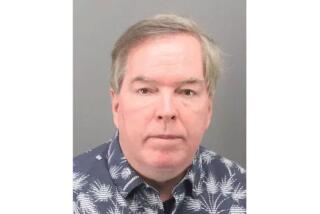Tax Scam Leader Receives 15-Year Prison Term, Fine : Fraud: L. A. man continues to deny ringleader role in what U. S. calls one of the largest electronic schemes uncovered by the IRS.
- Share via
Accused of masterminding one of the largest electronic tax scams ever, a Los Angeles man was sentenced Tuesday to 15 years in prison and ordered to pay $300,000 in restitution and fines, a record punishment in such a case.
Prosecutors welcomed the sentence handed down by U. S. District Judge Laughlin E. Waters against Jerome Hearne and said it would help them fight such scams, which have taken root across the country but seem especially popular in Southern California. Hearne’s scams involved hundreds of people and defrauded the government out of more than $1 million, according to Internal Revenue Service investigators.
“When the textbook on this kind of scam is written, Hearne will be the first chapter,” said Eric C. Lisann, a special assistant U. S. attorney who prosecuted Hearne. “There are many more people who are trying to follow his success.”
Hearne’s lawyer, Louis Bernstein, called the sentence “horrible” and said it will be appealed. Seven other defendants in the case have been sentenced, all to much shorter terms than Hearne, a 36-year-old former producer for “Ladies Professional Wrestling” television show.
The scams--which are spreading as electronic filing becomes widely available--depend on a combination of clever ringleaders and scores of co-conspirators, usually homeless or unemployed people.
In Hearne’s case and in the scores of scams like it, the ringleaders supply fake W-2 forms and instructions on how to prepare a false return.
The unemployed people then file the fake returns and apply for loans based on the expected refund. Banks often will grant loans based on preliminary acceptance of the tax return, and by the time the IRS has investigated it fully, the tax filer and the other conspirators have divided up the money and disappeared.
The government has mounted a concerted effort to crack down on the schemes, and the IRS’s Criminal Investigation Division here now devotes more manpower to fighting electronic filing fraud than to any other area. Hearne’s scheme was uncovered by the local office, and agents here hope his long sentence will send a message to others considering the scam.
“We’re trying to make sure that people know the risk they take when they decide to get involved in one of these schemes,” said Dennis E. Crawford, chief of the IRS’ Criminal Investigation Division in Los Angeles. “As these people get caught, they’re going to get sentenced, and they’re going to go to prison.”
At a lengthy sentencing hearing Tuesday, Hearne--who has previous convictions for armed robbery, forgery and other offenses--disputed the government’s portrayal of his role in the conspiracy.
He admitted that he participated in the scheme, but denied that he acted as the ringleader of the group.
“I’d just like to say that I’m sorry all this happened the way it did,” said Hearne, who has been in custody since he skipped a previous court hearing, became a fugitive and had to be arrested again. “It just got blown out of proportion. . . . The amount of money is not what is said by the government.”
Hearne said that the total take from the scam was between $150,000 and 200,000, far less than the $1.2 million or more that the government said was obtained.
Prosecutors said Hearne filed 267 fraudulent tax returns totaling about $700,000 during the 1990 tax season. Government agents say Hearne’s business grew so big that associates sometimes introduced him as the “tax man.”
The government also presented 27 other tax returns from before 1990 that the IRS says are a sampling of Hearne’s work.
All of the forms were different, but many used identical addresses, company names, dependents and child-care services. According to the government, Hearne and his accomplices would mix and match details, so that one return would list a person as a dependent grandmother, while that same person would show up as a dependent daughter on another form.
Most of the forms also bore one other detail in common, said Judge Waters: They donated an extra $1 to help finance presidential campaigns.
“An exercise of good citizenship, I suppose,” the judge said wryly.
In his remarks and in a string of objections, Bernstein vigorously opposed the government’s characterization of his client. Bernstein said Hearne only was responsible for a few dozen false returns, and had been tarred as the ringleader because other defendants in the case had come to trial first and had accused Hearne to take pressure off themselves.
“He’s not the kingpin of this scheme,” Bernstein said. “He’s not the leader of this scheme . . . . Unfortunately, he was the last (to be tried), so the buck stops here.”
Bernstein asked Waters to impose a sentence of between seven and nine years.
Waters, however, made it clear that he believed Hearne was the ringleader and deserved a stiff sentence. Calling Hearne “the kingpin of this particular conspiracy,” Waters departed from the sentencing guidelines to impose a harsher penalty.
“He is a loose cannon,” Waters said. “He has no respect for the law.”
In addition to the 15-year prison sentence, Hearne was fined $100,000 and ordered to pay the U. S. Treasury $200,000 in restitution. Under the terms of Waters’ sentence, Hearne will spend another three years under supervised release once he is out of prison.
More to Read
Inside the business of entertainment
The Wide Shot brings you news, analysis and insights on everything from streaming wars to production — and what it all means for the future.
You may occasionally receive promotional content from the Los Angeles Times.










